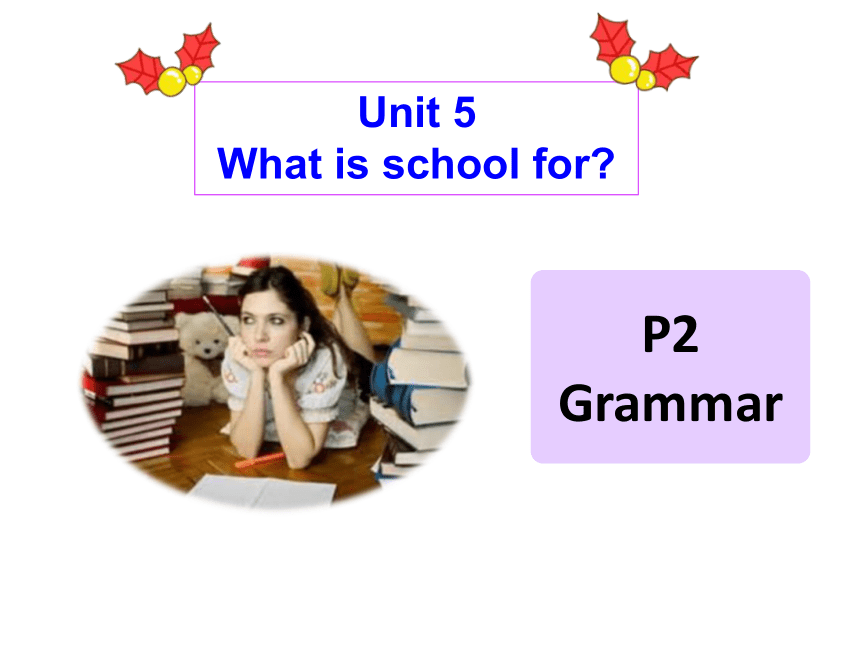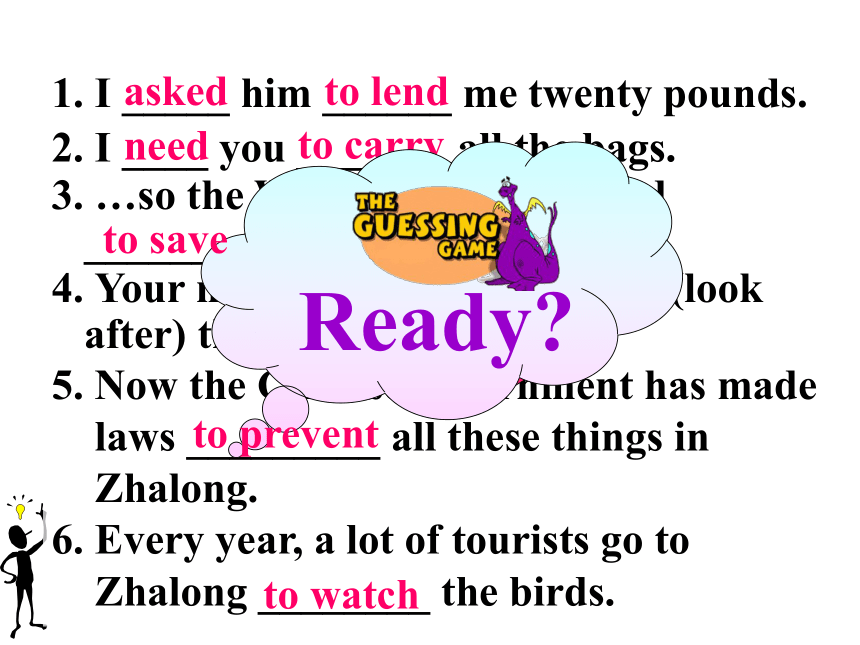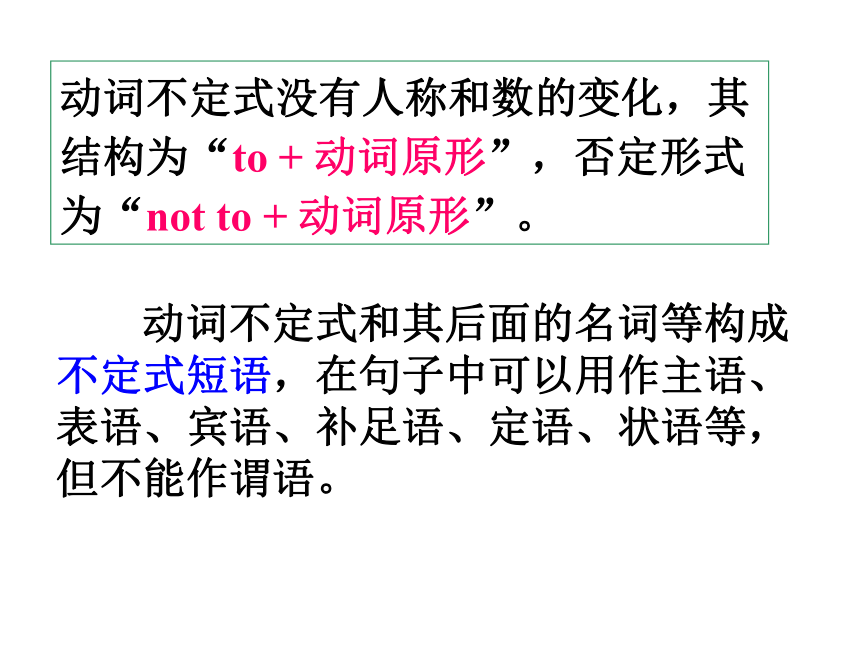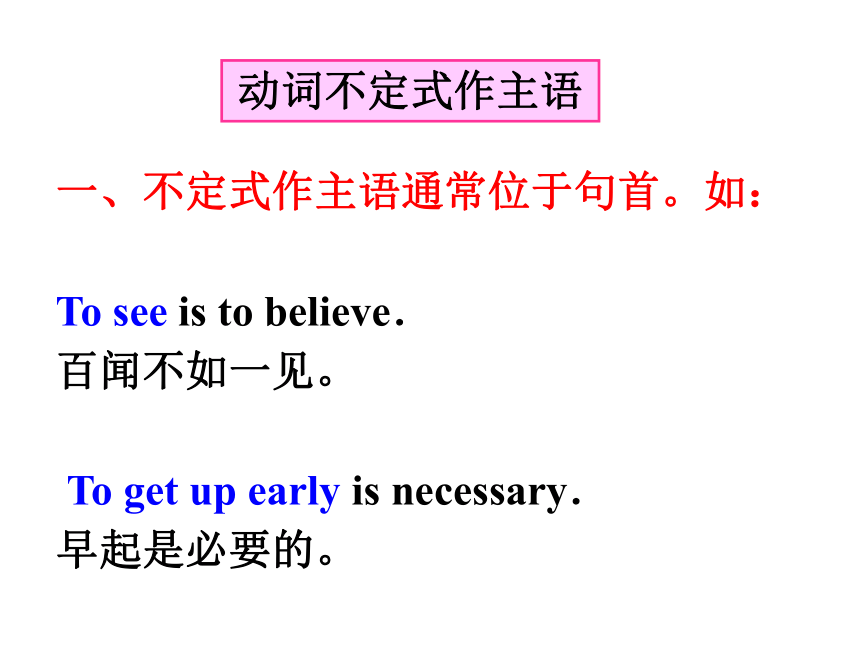教科版 必修一 Unit 5 What is school for Grammar(共29张PPT)
文档属性
| 名称 | 教科版 必修一 Unit 5 What is school for Grammar(共29张PPT) |

|
|
| 格式 | zip | ||
| 文件大小 | 464.7KB | ||
| 资源类型 | 试卷 | ||
| 版本资源 | 其它版本 | ||
| 科目 | 英语 | ||
| 更新时间 | 2021-08-09 00:00:00 | ||
图片预览









文档简介
(共29张PPT)
Unit
5
What
is
school
for?
P2
Grammar
Objectives
To
learn
to
use
the
infinitive
1.
I
asked
him
to
lend
me
twenty
pounds.
2.
I
need
you
to
carry
all
the
bags.
3.
…so
the
WWF
is
working
hard
to
save
them
all.
4.
Your
money
pays
to
look
after
the
animals.
5.
Now
the
Chinese
government
has
made
laws
to
prevent
all
these
things
in
Zhalong.
6.
Every
year,
a
lot
of
tourists
go
to
Zhalong
to
watch
the
birds.
1.
I
_____
him
______
me
twenty
pounds.
2.
I
____
you
_______
all
the
bags.
3.
…so
the
WWF
is
working
hard
_________
(save)
them
all.
4.
Your
money
pays
___________
(look
after)
the
animals.
5.
Now
the
Chinese
government
has
made
laws
_________
all
these
things
in
Zhalong.
6.
Every
year,
a
lot
of
tourists
go
to
Zhalong
________
the
birds.
asked
to
lend
need
to
carry
go
to
look
after
Ready?
to
save
to
prevent
to
watch
当两个动词连用时,主要行为动词后面的动词采用了“to
+
动词原形”的结构,即动词不定式。
什么是动词不定式(‘infinitive’)?
We
decided
to
stay
for
a
cup
of
tea.
我们决定留下来喝杯茶。
动词不定式
动词不定式没有人称和数的变化,其结构为“to
+
动词原形”,否定形式为“not
to
+
动词原形”。
动词不定式和其后面的名词等构成不定式短语,在句子中可以用作主语、表语、宾语、补足语、定语、状语等,但不能作谓语。
动词不定式作主语
一、不定式作主语通常位于句首。如:
To?see?is?to?believe.
百闻不如一见。
?To?get?up?early?is?necessary.
早起是必要的。
二、把引导词it放在句首作形式主语,而把真正的主语———动词不定式(短语)放在后面。如:
It’s?not?easy?to?work?out?the?problem.
计算出这道题不容易。
It?is?interesting?to?play?with?snow?in?winter.
冬季里玩雪是很有趣的。
动词不定式常在动词后作宾语。这类动词有
learn,
want,
decide,
like,
try,
agree,
start,
forget,
hope等。这类动词均属于及物动词,动词不定式置于谓语动词之后作宾语,表明想要、计划或希望要做(或发生)的事。如:
My
sister
wants
to
be
a
teacher.
我的妹妹想当一名教师。
We
should
learn
to
deal
with
these
problems.
我们应该学会处理这些问题。
动词不定式作宾语
动词
+
to
do
sth.
的固定搭配:
want
to
do
sth.
decide
to
do
sth.
hope
to
do
sth.
plan
to
do
sth.
offer
to
do
sth.
agree
to
do
sth.
learn
to
do
sth.
begin,
prepare,
remember,
try,
choose,
would
like,
wish,
promise,
refuse,
seem,
fail等词也有同样的用法。
My
mum
asks
me
to
play
the
piano
two
hours
every
day.
我妈妈让我每天弹两小时的钢琴。
我们还可以用动词不定式来补充说明宾语的情况,此时动词不定式在句中作宾语补足语。
动词不定式作宾语补足语,有带to和不带to两种形式。
老师叫我们每天读英语。
The
teacher
asked
us
to
read
English
every
day.
我母亲让我打扫卧室。
My
mother
made
me
clean
my
bedroom.
The
teacher
told
me
to
clean
the
blackboard.
I
want
you
to
give
me
some
help.
常跟带to的动词不定式作宾语补足语的动词有:
warn,
tell,
allow,
ask,
order,
get,
invite,
wish,
want,
encourage,
advise,
like,
love,
hate…
+
sb.
to
do
sth.
notice
listen
to
hear
watch
五看
see
look
at
observe
三使
let
make
have
二听
一感觉:
feel
+
sb.
do
sth.
(不带to)
常跟不带to的动词不定式作宾语补足语的动词有:
动词help后面的动词不定式可带to,也可不带to。
She
often
helps
me
(to)
do
the
housework.
她常常帮我做家务。
We
helped
him
(to)
fix
his
bike.
我们帮他修自行车。
一、我们可以用动词不定式表示某一动作或状态的目的,即动词不定式作目的状语。
I
had
to
work
hard
to
earn
money.
我不得不努力工作赚钱。
He
stayed
at
home
to
finish
his
homework.
他留在家完成作业。
动词不定式作状语
由
in
order
to
引导的目的状语,既可以置于句尾,也可以置于句首。
They
started
early
in
order
to
get
there
in
time.
=
In
order
to
get
there
in
time,
they
started
early.
为了及时赶到那里,他们很早就出发了。
为了使目的意义更加清楚或表示强调意义时,还可以在前面加
in
order
to。
She
is
running
quickly
in
order
to
catch
the
train.
为了赶火车,她正飞快地跑着。
二、不定式做原因状语往往要放在表示人的喜怒哀乐等情感的形容词或分词之后。这些形容词有
angry,
anxious,
content,
clever,
cruel,
delighted,
disappointed,
excited,
foolish,
glad,
happy,
pleased,
pound,
ready,
sorry,
surprised,
willing,
fortunate,
right,
wrong,
foolish,
luck,
quick,
slow等。
I
am
glad
to
see
you.
Many
people
are
content
to
live
a
simple
life.
三、不定式作结果状语,有下面几种情况:
(1)only
to
do
表示出人意料、意想不到的结果
eg.
we
hurried
to
the
railway
station
only
to
find
the
train
had
left.
我们匆匆忙忙的去了火车站,结果发现火车已经离开。
(2)adj.+
enough
to
do,
too+
adj.
+to
do结构
eg.
The
boy
isn’t
old
enough
to
go
to
school.
=
The
boy
is
too
young
to
go
to
school.
这个孩子太小,还不够上学的年龄。
(3)
so(such)…as
to
do结构
“如此……以致……”
eg.
I
am
not
such
a
fool
as
to
believe
a
cheat.
我不至于如此傻去相信一个骗子。
He
is
so
kind
as
to
help
the
old
lady
off
the
bus.
他是如此善良,帮助那位老太太下车。
动词不定式作定语
(1)不定式作定语,要放在所修饰的词的后面。
Is
this
the
best
way
to
help
him?
(2)不定式作定语,与其被修饰的词在逻辑上有主谓关系或动宾关系。
Have?you?got?a?key?to?unlock?the?door?
Please
give
me
something
to
drink.
(主谓关系)
(动宾关系)
(3)
当不定式作定语,且与被修饰的词有逻辑上的动宾关系时,不定式动词应该是及物动词;如果不定式动词为不及物动词,则该动词必须与介词连用,使其成为及物的短语动词.
He
has
a
lot
of
books
to
read.
Do
you
have
anything
else
to
say?
She
has
nothing
to
worry
about.
He
wanted
to
find
a
new
house
to
live
in.
动词不定式作表语
不定式可放在be动词后面,构成表语。
My
work
is
to
clean
the
room
every
day.
我的工作就是每天清扫房间。
His
dream
is
to
be
a
doctor.
他的理想是成为一名医生。
P53
1
Find
the
infinitive
in
these
sentences
and
list
them
according
to
their
functions
in
the
following
table.
It
is
hard
to
please
all.
To
know
oneself
is
wise;
to
forget
oneself
is
foolish.
It
is
impolite
of
him
to
leave
without
saying
good-bye.
I
asked
to
see
the
general
manager.
He
can
hardly
afford
to
miss
another
day
at
school.
Don’t
hesitate
to
let
me
know
if
there’s
anything
I
can
do
for
you.
One
should
eat
to
live,
but
not
live
to
eat.
They
were
thus
separated,
never
to
meet
again.
I’m
only
too
glad
to
see
you!
The
children
loved
to
see
the
clown.
主语
主语
主语
宾语
宾语
宾语
状语
宾语
状语
宾语
P54
3
Fill
in
the
blanks
with
the
right
form
of
the
verbs.
The
man
said
he
would
try
______
(do)
it
well.
The
doctor
asked
him
________
(stop)
smoking.
(3)
It
might
be
better
__________
(discuss)
it
in
his
own
language.
Since
his
English
is
not
good
enough
yet.
(4)
They
hope
________
(solve)
the
problem
soon.
(5)
Will
you
help
me
__________
(finish)
the
work?
(6)
We
planned
________
(have)
a
picnic
yesterday,
but
it
rained
and
we
had
________
(give)
it
up.
(7)
Do
you
think
it’s
wise
______
(let)
your
children
______
(cycle)
to
school?
(8)
Jones
came
very
close
to
_____
(win)
a
gold
medal
for
Britain
in
the
Olympics
last
year.
(9)
It
tends
_______
(snow)
quite
a
lot
in
winter
in
the
north
of
China.
(10)
I
searched
the
desk
and
discovered
the
letter
________
(hide)
under
some
pictures.
to
do
to
stop
to
discuss
to
solve
to
finish
to
have
to
give
to
let
cycle
win
to
snow
hidden
用所给单词的适当形式填空。
1.
In
order
to
______
(arrive)
in
Beijing
on
time,
Mr
Li
got
up
at
four
o’clock.
2.
I’d
advise
you
_______
(drink)
more
water.
3.
The
mother
made
her
daughter
_____
(have)
meals
by
herself.
4.
What
should
we
do
________
(protect)
the
environment?
5.
More
and
more
people
begin
to
do
something
______
killing
wild
animals.
arrive
to
drink
have
to
protect
to
stop
Practice
6.
Don’t
worry.
I’ll
try
_______
(help)
you.
7.
Remember
_______
(give)
some
food
to
the
pet
dog
every
day.
8.
Please
don’t
forget
________
(clean)
the
room
while
I
am
away
in
Beijing.
9.
—What’s
your
plan
for
the
summer
holiday?
—I
decided
______
(stay)
at
home
and
have
a
good
rest
first.
10.
________
(keep)
healthy,
she
often
does
some
sports.
to
help
to
give
to
clean
to
stay
To
keep
1.
老师要我们尽量保持安静。
The
teacher
wanted
us
_____________
______.
2.
老师告诉我们不要落下任何东西。
The
teacher
told
us
__________________
_______.
3.
我没有看见他们下车。
I
didn’t
_______________.
II.
完成句子。
to
try
to
keep
quiet
not
to
leave
anything
behind
see
them
get
off
4.
当小鹤足够大的时候,她的妈妈会让她
独自去觅食。
When
the
young
crane
is
old
enough,
her
mother
will
__________________
__________.
5.
为了飞去南方,天鹅必须要刻苦练习
飞翔。
________________,
swans
must
practice
flying
hard.
let/make
her
look
for
food
alone
To
fly
to
the
south
Unit
5
What
is
school
for?
P2
Grammar
Objectives
To
learn
to
use
the
infinitive
1.
I
asked
him
to
lend
me
twenty
pounds.
2.
I
need
you
to
carry
all
the
bags.
3.
…so
the
WWF
is
working
hard
to
save
them
all.
4.
Your
money
pays
to
look
after
the
animals.
5.
Now
the
Chinese
government
has
made
laws
to
prevent
all
these
things
in
Zhalong.
6.
Every
year,
a
lot
of
tourists
go
to
Zhalong
to
watch
the
birds.
1.
I
_____
him
______
me
twenty
pounds.
2.
I
____
you
_______
all
the
bags.
3.
…so
the
WWF
is
working
hard
_________
(save)
them
all.
4.
Your
money
pays
___________
(look
after)
the
animals.
5.
Now
the
Chinese
government
has
made
laws
_________
all
these
things
in
Zhalong.
6.
Every
year,
a
lot
of
tourists
go
to
Zhalong
________
the
birds.
asked
to
lend
need
to
carry
go
to
look
after
Ready?
to
save
to
prevent
to
watch
当两个动词连用时,主要行为动词后面的动词采用了“to
+
动词原形”的结构,即动词不定式。
什么是动词不定式(‘infinitive’)?
We
decided
to
stay
for
a
cup
of
tea.
我们决定留下来喝杯茶。
动词不定式
动词不定式没有人称和数的变化,其结构为“to
+
动词原形”,否定形式为“not
to
+
动词原形”。
动词不定式和其后面的名词等构成不定式短语,在句子中可以用作主语、表语、宾语、补足语、定语、状语等,但不能作谓语。
动词不定式作主语
一、不定式作主语通常位于句首。如:
To?see?is?to?believe.
百闻不如一见。
?To?get?up?early?is?necessary.
早起是必要的。
二、把引导词it放在句首作形式主语,而把真正的主语———动词不定式(短语)放在后面。如:
It’s?not?easy?to?work?out?the?problem.
计算出这道题不容易。
It?is?interesting?to?play?with?snow?in?winter.
冬季里玩雪是很有趣的。
动词不定式常在动词后作宾语。这类动词有
learn,
want,
decide,
like,
try,
agree,
start,
forget,
hope等。这类动词均属于及物动词,动词不定式置于谓语动词之后作宾语,表明想要、计划或希望要做(或发生)的事。如:
My
sister
wants
to
be
a
teacher.
我的妹妹想当一名教师。
We
should
learn
to
deal
with
these
problems.
我们应该学会处理这些问题。
动词不定式作宾语
动词
+
to
do
sth.
的固定搭配:
want
to
do
sth.
decide
to
do
sth.
hope
to
do
sth.
plan
to
do
sth.
offer
to
do
sth.
agree
to
do
sth.
learn
to
do
sth.
begin,
prepare,
remember,
try,
choose,
would
like,
wish,
promise,
refuse,
seem,
fail等词也有同样的用法。
My
mum
asks
me
to
play
the
piano
two
hours
every
day.
我妈妈让我每天弹两小时的钢琴。
我们还可以用动词不定式来补充说明宾语的情况,此时动词不定式在句中作宾语补足语。
动词不定式作宾语补足语,有带to和不带to两种形式。
老师叫我们每天读英语。
The
teacher
asked
us
to
read
English
every
day.
我母亲让我打扫卧室。
My
mother
made
me
clean
my
bedroom.
The
teacher
told
me
to
clean
the
blackboard.
I
want
you
to
give
me
some
help.
常跟带to的动词不定式作宾语补足语的动词有:
warn,
tell,
allow,
ask,
order,
get,
invite,
wish,
want,
encourage,
advise,
like,
love,
hate…
+
sb.
to
do
sth.
notice
listen
to
hear
watch
五看
see
look
at
observe
三使
let
make
have
二听
一感觉:
feel
+
sb.
do
sth.
(不带to)
常跟不带to的动词不定式作宾语补足语的动词有:
动词help后面的动词不定式可带to,也可不带to。
She
often
helps
me
(to)
do
the
housework.
她常常帮我做家务。
We
helped
him
(to)
fix
his
bike.
我们帮他修自行车。
一、我们可以用动词不定式表示某一动作或状态的目的,即动词不定式作目的状语。
I
had
to
work
hard
to
earn
money.
我不得不努力工作赚钱。
He
stayed
at
home
to
finish
his
homework.
他留在家完成作业。
动词不定式作状语
由
in
order
to
引导的目的状语,既可以置于句尾,也可以置于句首。
They
started
early
in
order
to
get
there
in
time.
=
In
order
to
get
there
in
time,
they
started
early.
为了及时赶到那里,他们很早就出发了。
为了使目的意义更加清楚或表示强调意义时,还可以在前面加
in
order
to。
She
is
running
quickly
in
order
to
catch
the
train.
为了赶火车,她正飞快地跑着。
二、不定式做原因状语往往要放在表示人的喜怒哀乐等情感的形容词或分词之后。这些形容词有
angry,
anxious,
content,
clever,
cruel,
delighted,
disappointed,
excited,
foolish,
glad,
happy,
pleased,
pound,
ready,
sorry,
surprised,
willing,
fortunate,
right,
wrong,
foolish,
luck,
quick,
slow等。
I
am
glad
to
see
you.
Many
people
are
content
to
live
a
simple
life.
三、不定式作结果状语,有下面几种情况:
(1)only
to
do
表示出人意料、意想不到的结果
eg.
we
hurried
to
the
railway
station
only
to
find
the
train
had
left.
我们匆匆忙忙的去了火车站,结果发现火车已经离开。
(2)adj.+
enough
to
do,
too+
adj.
+to
do结构
eg.
The
boy
isn’t
old
enough
to
go
to
school.
=
The
boy
is
too
young
to
go
to
school.
这个孩子太小,还不够上学的年龄。
(3)
so(such)…as
to
do结构
“如此……以致……”
eg.
I
am
not
such
a
fool
as
to
believe
a
cheat.
我不至于如此傻去相信一个骗子。
He
is
so
kind
as
to
help
the
old
lady
off
the
bus.
他是如此善良,帮助那位老太太下车。
动词不定式作定语
(1)不定式作定语,要放在所修饰的词的后面。
Is
this
the
best
way
to
help
him?
(2)不定式作定语,与其被修饰的词在逻辑上有主谓关系或动宾关系。
Have?you?got?a?key?to?unlock?the?door?
Please
give
me
something
to
drink.
(主谓关系)
(动宾关系)
(3)
当不定式作定语,且与被修饰的词有逻辑上的动宾关系时,不定式动词应该是及物动词;如果不定式动词为不及物动词,则该动词必须与介词连用,使其成为及物的短语动词.
He
has
a
lot
of
books
to
read.
Do
you
have
anything
else
to
say?
She
has
nothing
to
worry
about.
He
wanted
to
find
a
new
house
to
live
in.
动词不定式作表语
不定式可放在be动词后面,构成表语。
My
work
is
to
clean
the
room
every
day.
我的工作就是每天清扫房间。
His
dream
is
to
be
a
doctor.
他的理想是成为一名医生。
P53
1
Find
the
infinitive
in
these
sentences
and
list
them
according
to
their
functions
in
the
following
table.
It
is
hard
to
please
all.
To
know
oneself
is
wise;
to
forget
oneself
is
foolish.
It
is
impolite
of
him
to
leave
without
saying
good-bye.
I
asked
to
see
the
general
manager.
He
can
hardly
afford
to
miss
another
day
at
school.
Don’t
hesitate
to
let
me
know
if
there’s
anything
I
can
do
for
you.
One
should
eat
to
live,
but
not
live
to
eat.
They
were
thus
separated,
never
to
meet
again.
I’m
only
too
glad
to
see
you!
The
children
loved
to
see
the
clown.
主语
主语
主语
宾语
宾语
宾语
状语
宾语
状语
宾语
P54
3
Fill
in
the
blanks
with
the
right
form
of
the
verbs.
The
man
said
he
would
try
______
(do)
it
well.
The
doctor
asked
him
________
(stop)
smoking.
(3)
It
might
be
better
__________
(discuss)
it
in
his
own
language.
Since
his
English
is
not
good
enough
yet.
(4)
They
hope
________
(solve)
the
problem
soon.
(5)
Will
you
help
me
__________
(finish)
the
work?
(6)
We
planned
________
(have)
a
picnic
yesterday,
but
it
rained
and
we
had
________
(give)
it
up.
(7)
Do
you
think
it’s
wise
______
(let)
your
children
______
(cycle)
to
school?
(8)
Jones
came
very
close
to
_____
(win)
a
gold
medal
for
Britain
in
the
Olympics
last
year.
(9)
It
tends
_______
(snow)
quite
a
lot
in
winter
in
the
north
of
China.
(10)
I
searched
the
desk
and
discovered
the
letter
________
(hide)
under
some
pictures.
to
do
to
stop
to
discuss
to
solve
to
finish
to
have
to
give
to
let
cycle
win
to
snow
hidden
用所给单词的适当形式填空。
1.
In
order
to
______
(arrive)
in
Beijing
on
time,
Mr
Li
got
up
at
four
o’clock.
2.
I’d
advise
you
_______
(drink)
more
water.
3.
The
mother
made
her
daughter
_____
(have)
meals
by
herself.
4.
What
should
we
do
________
(protect)
the
environment?
5.
More
and
more
people
begin
to
do
something
______
killing
wild
animals.
arrive
to
drink
have
to
protect
to
stop
Practice
6.
Don’t
worry.
I’ll
try
_______
(help)
you.
7.
Remember
_______
(give)
some
food
to
the
pet
dog
every
day.
8.
Please
don’t
forget
________
(clean)
the
room
while
I
am
away
in
Beijing.
9.
—What’s
your
plan
for
the
summer
holiday?
—I
decided
______
(stay)
at
home
and
have
a
good
rest
first.
10.
________
(keep)
healthy,
she
often
does
some
sports.
to
help
to
give
to
clean
to
stay
To
keep
1.
老师要我们尽量保持安静。
The
teacher
wanted
us
_____________
______.
2.
老师告诉我们不要落下任何东西。
The
teacher
told
us
__________________
_______.
3.
我没有看见他们下车。
I
didn’t
_______________.
II.
完成句子。
to
try
to
keep
quiet
not
to
leave
anything
behind
see
them
get
off
4.
当小鹤足够大的时候,她的妈妈会让她
独自去觅食。
When
the
young
crane
is
old
enough,
her
mother
will
__________________
__________.
5.
为了飞去南方,天鹅必须要刻苦练习
飞翔。
________________,
swans
must
practice
flying
hard.
let/make
her
look
for
food
alone
To
fly
to
the
south
同课章节目录
